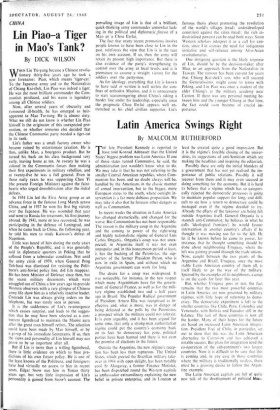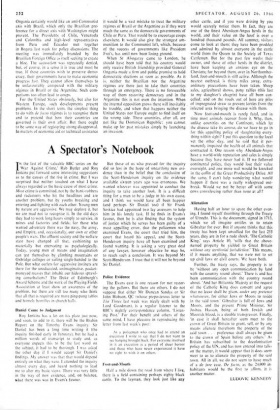Latin America Swings Right
By MALCOLM RUTHERFORD
In recent weeks the situation in Latin America has changed dramatically, and changed for the worse. But Communism has not been responsible. The reason is the military coup in the Argentine and the coming to power of the right-wing and highly nationalistic regime of General Luis Carlos Ongania. Ongania's coup was not unex- pected; in Argentina itself it was not even unpopular and, in this honeymoon period at least, it has the backing of the Peronistas, the sup- porters of the former President Peron, who is now in exile in Spain, and without which no Argentine government can work for long.
The desire for a coup was widespread. It was noticeable, for instance, in the new respect which many Argentinians have for the govern- ment of General Franco, as well as for the mili- tary regime established, two and a half years ago in Brazil. The Popular Radical government of President Arturo Illia was recognised as in- effective and, what is more, was in danger of being defeated at the polls by the Peronistas, a prospect which the military could not tolerate. It is even arguable, and it has been argued for some time, that only a strong-man authoritarian regime could put the country's economy back on its feet. So democracy has gone, political parties have been banned and there is not even the promise of elections in the future.
Outside the Argentine, the new regime's recep- tion has been less than rapturous. The United States, which greeted the Brazilian military take- over in 1964 with open delight, has been notably cool. Sr Alsogaray, a former Finance Minister, has been dispatched round the Western capitals as ambassador extraordinary explaining the new belief in private enterprise, and in London at
least he created quite a good impression. But it is the regime's forcible closing of the univer- sities, its suggestions of anti-Semitism which are making the headlines and inspiring the editorials.
Possibly these are only the initial blunders of a' government that has not yet realised the im- portance of public relations. Possibly it will recover from them and it may even succeed in doing something for the economy. But it is hard to believe that a regime which has so categori- cally rejected the democratic processes is going to maintain popular support for long, and diffi- cult to see how a return to democracy could be managed even if the regime decided to try. Already the effects of the takeover are being felt outside Argentina itself. General Ongania is a staunch anti-Communist; he believes in what he calls `ideological frontiers'; he would favour intervention in another country's affairs if he thought it was moving too far to the left. He let it be known before he came to power, for instance, that he thought something should be done about neighbouring Uruguay, where the left was gaining ground through the trade unions. Now, caught between the two giants of the Argentine and Brazil, Uruguay, once the most stable Latin American country of them all, is itself likely to go the way of the military. Spurred by the examples of its neighbours, a coup is on the cards for later this year.
But, whether Uruguay goes or not, the fact remains that the two most powerful countries in Latin America are now governed by military regimes, with little hope of returning to demo- cracy. The democratic experiment is left to the smaller countries like Chile, Peru, Colombia and Venezuela, with Bolivia and Ecuador still in the balance. The task of these countries is now all the harder. Many of their hopes for the future are based on increased Latin American integra- tion. President Frei of Chile, in particular, set out to show that this was the Latin American alternative to Castroism and has achieved a notable success. But plans for integration need the co-operation of the sub-continent's two largest countries. Now it is difficult to be sure that this is coming and, in any case in those countries where the military is traditionally restless, there must be a growing desire to follow the Argen- tine example.
The Latin American capitals are full of quite new talk of the development of political blocs. Ongania certainly would like an anti-Communist axis with Brazil, which only the Brazilian pre- ference for a direct axis with Washington might prevent. The Presidents of Chile, Venezuela and Colombia and high-level representatives from Peru and Ecuador met together in Bogota last week for policy discussions. The meeting was immediately branded by the Brazilian Foreign Office as itself seeking to create a bloc. The accusation was repeatedly denied, but, of course, in a sense it is true and must be true. If these countries wish to preserve demo- cracy, their governments have to make economic progress fast. They cannot allow themselves to be unfavourably compared with the military regimes in Brazil or the Argentine. Such com- parisons too often lead to coups.
For the United States obviously, but also for Western Europe, such developments present problems. In the short term, the simplest thing to do with de facto regimes is to recognise them and to pretend that how their countries are governed is their own affair. But there ought to be some way of registering strong disapproval. In matters of economic aid or technical assistance it would be a vast mistake to treat the military regimes of Brazil or the Argentine as if they were much the same as the democratic governments of Chile or Peru. That would be to encourage coups elsewhere. It would also give the strongest am- munition to the Communist left, which, because of the success of governments like President Frei's, has until now been losing ground.
When Sr Alsogaray came to London, he should have been told that his country would only receive British friendship provided General Ongania made a firm and public promise to hold democratic elections as soon as possible. As it is, neither the Brazilian nor the Argentine regimes are there just to take their countries through an emergency. There is no foreseeable way of them restoring democracy and in the Argentine this is not even the intention. When the internal opposition grows there will inevitably be trouble, and when that happens neither the United States nor Europe ought to find itself on the wrong side. These countries, after all, are not like the Dominican Republic : you cannot make up for past mistakes simply by launching an invasion.































 Previous page
Previous page